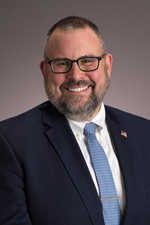BUW Names Former North Adams Mayor Bernard as New President
 |
| Thomas Bernard |
PITTSFIELD, Mass. — Former North Adams Mayor Thomas Bernard has been named president and chief executive officer of the Berkshire United Way.
He replaces Candace Winkler, who stepped down in August after about 18 months in the role. Winkler took a positoin with a nonprofit in Washington, D.C.
Bernard finished up two two terms as mayor of North Adams at this end of 2021, declining to run for a third term. He begins his new post on Jan. 24.
"I'm thrilled to begin the next chapter of my career as part of the Berkshire United Way team," Bernard said in a statement announcing his new position. "The organization's mission is clear and critical, and the board, staff, partner agencies, and individuals we serve are laser-focused on building a stronger and more resilient community throughout the Berkshires. Our work has been a cornerstone of supporting individuals and strengthening families for nearly a century, and our role will continue to evolve and our impact magnify as we work together to address the challenges and opportunities ahead of us."
Prior to his election in 2017, Bernard worked in development areas for two local nonprofits. He was development officer at the Massachusetts Museum of Contemporary Art and then director of corporate, foundation, and government relations, then executive assistant to the president, and eventually director of business affairs at Massachusetts College of Liberal Arts. He had a brief stint as director of special projects at Smith College before becoming mayor.
"Tom's proven leadership experience and dedication to the community will serve him well as head of Berkshire United Way," said Michael Stoddard, chairman of the BUW board. "He has worked with multiple stakeholders, is familiar with federal and state granting agencies and processes, and has experience in community and economic development, and strategic planning. His leadership and response to the needs of his constituents during COVID-19 also shows his ability to quickly adapt and address emerging and critical needs.
"His passion for public service, commitment to being an advocate and voice for change, and willingness to collaborate with others to build a stronger community align with Berkshire United Way's mission and vision. The staff and board look forward to having him join the team."
Tags: Berkshire United Way,

